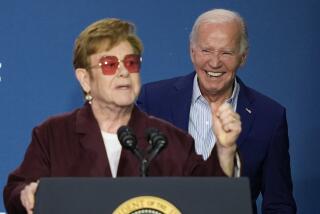Bush Urges Same-Sex Marriage Ban
- Share via
WASHINGTON — President Bush on Tuesday called for a constitutional amendment to define marriage as a union between a man and a woman, as he expressed alarm at the gay marriages conducted in San Francisco and the potential for same-sex weddings soon in Massachusetts.
In backing an amendment, which his conservative supporters regarded as overdue, Bush thrust the gay marriage issue squarely into the presidential campaign and all but ensured that the controversy would remain alive beyond the November election.
“If we are to prevent the meaning of marriage from being changed forever, our nation must enact a constitutional amendment to protect marriage in America,” the president said in a statement that he read at a hastily arranged appearance in the Roosevelt Room of the White House.
He emphasized that he understood the historic consequences of his stance, declaring: “An amendment to the Constitution is never to be undertaken lightly. The amendment process has addressed many serious matters of national concern. And the preservation of marriage rises to this level of national importance.”
The president left the room abruptly after his five-minute statement, leaving shouted questions from reporters hanging in the air.
Bush’s announcement drew praise from social conservatives, who form the core of the president’s political base, and condemnation from advocates for civil rights and gay rights.
The president’s call to ban gay marriage came only a day after he abandoned his above-the-fray stance in the presidential campaign and attacked Sen. John F. Kerry of Massachusetts, the front-runner for the Democratic Party’s nomination.
Kerry and his leading challenger in the Democratic race, Sen. John Edwards of North Carolina, oppose gay marriages but say the issue should be left to the states. The senators separately accused Bush on Tuesday of playing politics with the controversy.
“All Americans should be concerned when a president who is in political trouble tries to tamper with the Constitution of the United States at the start of his reelection campaign,” Kerry said. He said Bush was “looking for a wedge issue to divide the American people.”
Edwards said in a statement: “We have had our Constitution for more than 200 years. We amended it to abolish slavery and to ensure women could vote. We should not amend it over politics.”
While the president said the Constitution should restrict marriage to the union of a man and a woman, he also said state legislatures should be free to “make their own choices in defining legal arrangements other than marriage,” such as civil unions.
Rep. Marilyn Musgrave (R-Colo.) and 115 co-sponsors already have introduced a proposed amendment in Congress that they say would take that approach.
Civil unions, legal only in Vermont, offer same-sex couples the identical state rights and benefits that married couples enjoy. But because civil unions have no federal standing, same-sex couples cannot take advantage of an array of federal benefits, such as filing joint federal tax returns and receiving survivors’ Social Security benefits.
Kerry said Tuesday that while he opposed gay marriage, he saw civil unions as an appropriate way to extend legal protections to gays and lesbians. Bush opposes civil unions, White House Press Secretary Scott McClellan said, although the president believes that states should decide individually whether to allow them.
Historically, proposed constitutional amendments face long odds, even when they have presidential backing. They require the approval of both houses of Congress -- by a two-thirds majority -- and ratification by three-quarters of the state legislatures. Over the years, thousands of amendments have been proposed, but only 17 have overcome those high hurdles since the original 10 were enacted as the Bill of Rights.
On Capitol Hill, Sen. John Cornyn (R-Texas) said his subcommittee of the Senate Judiciary Committee would hold hearings on the issue, starting next week.
“It is very likely that we will act,” said Senate Majority Leader Bill Frist (R-Tenn.), although he declined to predict whether the Senate would vote this year on an amendment.
One prominent Republican, Rep. David Dreier of San Dimas, said he would not support an amendment.
“I believe that this should go through the courts,” said Dreier, the influential chairman of the House Rules Committee. “We’re at a point where it’s not necessary, from my perspective.”
The controversy erupted when the Massachusetts Supreme Judicial Court, in twin rulings in November and this month, said that the state constitution guaranteed same-sex couples the right to wed. The court said marriage licenses could be given to gay couples as early as May.
Afterward, Bush said in a statement: “If activist judges insist on redefining marriage by court order, the only alternative will be the constitutional process.”
Conservatives immediately began pressing Bush to back such an amendment; but until Tuesday he refrained, saying that he was monitoring events around the country.
In the meantime, more than 3,000 gay and lesbian couples obtained marriage licenses at City Hall in San Francisco. In Sandoval County, N.M., a county clerk last week issued marriage licenses to about two dozen gay couples, although the state’s attorney general later issued an opinion saying the licenses were invalid under state law.
Reacting to those developments, Bush said Tuesday: “After more than two centuries of American jurisprudence, and millennia of human experience, a few judges and local authorities are presuming to change the most fundamental institution of civilization. Their actions have created confusion on an issue that requires clarity.
“Decisive and democratic action is needed, because attempts to redefine marriage in a single state or city could have serious consequences throughout the country,” the president said.
He warned that without a constitutional amendment, gay couples would argue in court that marriages conducted legally in one state, such as in Massachusetts, must be considered valid in all states. Under the “full faith and credit” clause of the Constitution, public acts and judicial proceedings of one state must be recognized by the others.
Legal experts said Bush was correct in asserting that current law could allow courts beyond Massachusetts to endorse gay marriage -- but not necessarily for the reason he cited.
Rather than draw on the full faith and credit clause, they said, federal courts and possibly a future U.S. Supreme Court might decide that refusing marriage licenses to gays is discriminatory and denies them equal protection of the law. A constitutional amendment prohibiting gay marriage would eliminate that possibility.
Congress in 1996 overwhelmingly passed the Defense of Marriage Act, which banned federal recognition of same-sex marriages and allowed states to disregard gay and lesbian marriages performed in other states.
Bush vowed to “vigorously defend” that law, but noted that it did not “protect marriage within any state or city.” And he warned: “There is no assurance that the Defense of Marriage Act will not, itself, be struck down by activist courts.”
Bush ended his remarks by urging all sides to “conduct this difficult debate in a manner worthy of our country -- without bitterness or anger.”
His comments drew sharp criticism from the Log Cabin Republicans, the oldest organization of gay conservatives. Its executive director, Patrick Guerriero, characterized an amendment as “writing discrimination into our Constitution” and said the group’s members were “outraged” by Bush’s effort to please conservative allies by using the Constitution “as a way of scoring points in an election year.”
Sen. Edward M. Kennedy (D-Mass.) said Bush had “betrayed his campaign promise to be ‘a uniter, not a divider.’ ”
But there was plenty of praise for the president as well.
Matt Daniel, head of the Alliance for Marriage and one of a handful of activists invited to Bush’s speech, expressed his gratitude to the president and said: “Americans believe that gays and lesbians have a right to live as they choose, but they don’t have a right to redefine marriage for our entire society.”
Earl Black, a political scientist at Rice University in Houston, said Bush’s move might risk the wrath of some centrist voters. But he said the issue might prove more problematic for Democrats, whose rank-and-file supporters include many blue-collar Catholic voters who likely are “with the president on this one.”
At the same time, Black said, Bush’s position could strengthen the GOP’s hold on the South, where Democrats hope to make inroads in November.
Harvard University’s Robert Blendon, a public opinion specialist, noted that many polls had shown that while most people opposed same-sex marriages, many were dubious about a constitutional amendment to ban them.
One poll completed Monday night by the University of Pennsylvania’s National Annenberg Election Survey found that 64% of people surveyed opposed laws that would permit same-sex marriages in their states. But only 41% support a constitutional amendment to ban same-sex marriages.
“People are really bothered by this issue, but they have concerns about amending the Constitution,” Blendon said.
*
Times staff writers Mary Curtius, Johanna Neuman, Richard B. Schmitt and Richard Simon in Washington; Maria La Ganga in Struthers, Ohio; Scott Martelle in Austin, Texas; and Elizabeth Mehren in Boston contributed to this report.
More to Read
Get the L.A. Times Politics newsletter
Deeply reported insights into legislation, politics and policy from Sacramento, Washington and beyond. In your inbox three times per week.
You may occasionally receive promotional content from the Los Angeles Times.










